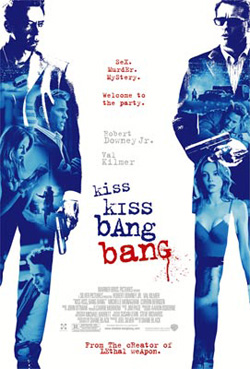 So for the past couple of weeks, I’ve slowly unleashed the press coverage for Kiss Kiss, Bang Bang. Check out Part 1 with Downey and Kilmer here and Part 2 with Michelle Monaghan here.
So for the past couple of weeks, I’ve slowly unleashed the press coverage for Kiss Kiss, Bang Bang. Check out Part 1 with Downey and Kilmer here and Part 2 with Michelle Monaghan here.
This week finally sees this baby go wide, but apparently, not in as many screens as we would’ve liked… which is crap. Guys, seriously, go see it. I’m not going to go into a long thing like Harry did over at AICN (though I do agree with him), but I am just going to say that this film is greatness (my number 1 or 2 of this year) and it needs to be seen. I’d like to see Shane Black get back in the director’s chair and craft something funny and clever like this again.
Anyway, here are the brains of the whole Kiss Kiss outfit from our roundtable session a few weeks ago at the Four Seasons Hotel in Beverly Hills. Smart, funny, and cool… probably the simplest and best way to describe this cat.
Kiss Kiss, Bang Bang opens wide this Friday. Watch it!
Q: So were there any "action movie" clichés you decided to leave out?
Black: I’m sure there are several that I’ve yet to get to. It was kind of the anti-action action movie in the sense that I tried to make everything… all the tough guy stuff… and put it on its ear a little bit. The violence in it and the action is very awkward. People are stumbling, the wrong person is shooting. Instead of this guy, it’s the vendor who shoots the bad guy at one point. I liked that the actual guy who is tough and knows how to kick down the door and rescue everybody happens to be gay. It’s interesting to me to take everything I love about tough guy movies and sort of conjure those elements and play with them. Just because I think that the only time I can do that is when there’s a genuine love for the material in the first place. I mean, there’s such fondness, and I hope it shows, for this kind of movie, the sorts of movies that evolved from say Dirty Harry, Point Blank, Night Moves, Bullitt, French Connection, The Seven-Ups. I can name these ‘70s type movies that for me were the template for making a good thriller. I don’t even like to call them action movies because the truth is that most “action movies” today I don’t like. I like movies that are really full of adventure or full of thrills, but just full of action doesn’t really make it for me.
Q: It’s kinda like, what really defines the "action" genre?
Black: Yeah, exactly. Hitchcock’s North by Northwest you’ve got a plane crashing and blowing up an oil tanker, you’ve got people falling off of Mount Rushmore, but I don’t think anybody refers to that as an action movie. It’s a suspense piece. Not only is it a good question but it’s also a pet peeve of mine in that I think that what pleases me is that I think movies are steering more towards character driven scripts that seem more like thrillers than action movies where you can’t just cast a wrestler. You actually need to get an actor to play the part because there’s a part to be acted. There’s actually something to be said or unearthed in the course of the movie, that the guy maybe has an arc or a discovery and most kickass movies, there’s really not a lot of discovery going on. I mean, I haven’t seen Doom but I can’t imagine that it’s got a lot of character in it.
Q: The public seems to be agreeing with you what with the failure of The Island, xXx: State of the Union, and Stealth. Is the well running dry?
Black: Well, I think those are [action movies] also, all of those, but I don’t think the well is dry at all. I think those are aimed at sort of a younger crowd, a very unsophisticated type of action audience in a way. I think if you do action movies that are aimed at being hip and using a lot of rock music and appealing to kids, there’s going to come a time where the kids get sick of that and say, "Look, we’re tired of being pandered to as if we’re a demographic group rather than individuals with a discerning sense of what we like and don’t like." For instance, Batman Begins, most of the people I talked to, kids I talked to say they liked that movie even though it’s very dark, because it at least has a story to it. You couldn’t just cast anybody as Batman. You needed a good actor. Christian Bale arguably in that movie is as tortured and goes through as much psychic trauma as any of these other sort of action heroes, like Seagal or Schwarzenegger would go through a physical ordeal in a movie of theirs.
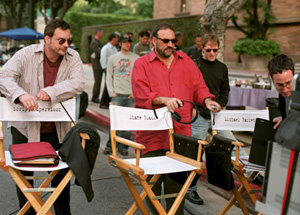 Q: Have you talked to Joel Silver about this problem?
Q: Have you talked to Joel Silver about this problem?
Black: I think so far Joel is exempt. Of the current crop, he hasn’t had a real one, except for the last two Matrix films. There hasn’t really been a Joel Silver action movie in the sense that it was just all action. The Matrix movies were a completion of a science fiction cycle that started with a very good movie. I think the reason this movie even exists is because Joel has the sensibilities to pick out from amongst a lot of action movies he could have made, one $15 million movie that he did not need to make. Certainly Warner Brothers doesn’t need to make $15 million movies but Joel asked them if they would. He asked for the money and he got it for me and then Joel stuck around and I swear to you, it’s his influence on this thing. Assuming that you liked any of it, a lot of it is because he made it better. We sat in a room together and I watched him do it. I watched him display a knowledge of film craft, of editing skills, shockingly with just a few like scalpel type cuts and then the movie’s better.
Q: Were you a fan of the mystery novel genre?
Black: Oh, absolutely. I wrote the shit on the back here. Because it’s aping the kinds of novels that I read when I was a kid.
Q: What surprised you as a director?
Black: One of the things I was definitely surprised by was how actual little physical sleep you can get away with for a period of seven, eight weeks and still not succumb. To actually be able to function and function at a focused level on two-three hours of sleep a night puts you in hyperdrive. I was fascinated by the process of directing. I did a lot of preparation, but once I was on the set, I didn’t think too much. And that was my discovery, that you just do what’s in front of you. Once you’ve plotted and planned and got your preparation done, and for me it was six months of I felt a fairly extensive preparation to come in and direct. Once you’re on the set then you have to start being flexible. Knowing you’ve got this to fall back on, the foundation that you’ve built, but in the meantime, you’re flexible enough to admit or acknowledge things that the actors might bring or different situations will occur to you along the way. What strikes me most about directing is how the symbiosis happens that it’s just sort of a sublime blur. And I don’t know often where the ideas come from. I think back and say, "Was that mine? Was that Downey’s? Was that Kilmer’s?" Somehow the scene happened. In that intensity of focus, there’s just this thing you conjure up. And if your attitude is right and if everyone is working on the same page, then you’ll conjure the correct result.
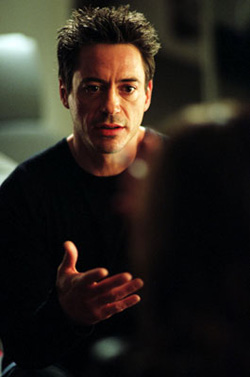 Q: Was there any scene that turned out differently than what you imagined?
Q: Was there any scene that turned out differently than what you imagined?
Black: Very differently, no. Cheaper. No, seriously. If you look, that actually contains the script god forbid, and you’ll see differences. You’ll see that one scene was cut and a lot of scenes, it describes it as though the car coming out over the lake is two feet above their heads and there’s brush flying and there’s diving for cover, rolling down a slope covered with mud. In the movie, they kind of sit in the car and watch it go [makes noise]. I don’t miss that. It would be nice to indulge that kind of frenetic first person harrowing quality that you need to spend a lot of money to get basically. If you’re going to do an action scene that really makes you feel like you’re in the midst of it, you’ve got to spend a lot of money on camera angles and a lot of time which we didn’t have. So okay. But the cuts we made were mostly budgetary.
Q: The title comes from James Bond, but there’s no reference?
Black: That’s correct. I like the bluntness of it. It’s a very simple austere title and it’s what the movie is. It’s half a romantic comedy and half a mystery thriller. It’s Kiss Kiss, Bang Bang. I’ve since of course on the internet been reminded ad nauseum that it’s also the title of a Pauline Kael book and how dare I desecrate the name of the sacred Pauline Fucking Kael by gracing her whatever words with my own hackdom.
Q: Really?
Black: Oh, hate mail.
Q: Have they seen the movie?
Black: No.
Q: Have they ever read Kael?
Black: No.
Q: Why are they complaining then?
Black: They haven’t seen it. They don’t realize that I’m sincere I think. Because I made so much money on those spec scripts I sold, I think there’s an image, and I fall into it myself. If I read about some young guy who’s directing action pictures making a ton of money, I’d probably think, "Oh, what a jerk. Probably some playboy, laughing all the way to the bank." The truth is, I was sort of a recluse and I was sort of a shy kid who actually my only hobby was standup comedy, oddly enough. I listened to it all day in an empty room just me laughing my ass off. But that was my entertainment, and then the books… I read so much that I developed dyslexia because my own mind rebelled and said, "Look, you’re not even saying hi to your mother and father anymore. You have to stop reading so much."
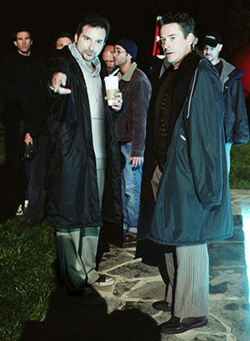 Q: You developed it from reading?
Q: You developed it from reading?
Black: I could read schoolbooks but sometimes when I tried to read for pleasure, I couldn’t make sense of the words anymore. And I figured out later, psychologically it’s because I was sensing from the people around me, especially my parents, this disapproval like they felt hurt. My dad would say, "Hi, I’m leaving for my trip for two weeks" and I’d go, "Yeah" and keep reading. I read too much. I read in school and I never dated. If I had a free period, instead of going out to play baseball, I’d read a book. So of course all of this combined to make me psycho.
Q: Who was your biggest inspiration? And how did you start reading so much?
Black: It was just in our family. There’s a bookshelf in our living room of books left over from my dad who’s a big tough guy fan. So you can find your Mickey Spillane there. So I’m literally a nine year old kid reading Mickey Spillane and my mother’s very upset because of the dirty parts. The naked parts.
Q: But you were more into the mystery and action?
Black: Yes, ostensibly. Yes and no. Basically I liked adult books more than I liked kids books, although some of them, like I don’t know if you’ve heard of The Three Investigators. Somebody’s going to make a movie of that. Those are great. Butit just kills me in this country. Like Harry Potter, kids are lining up to read an 800 page novel and what do we hear in the south? They’re protesting the book because it advocates sorcery and demonism and therefore must be associated with the devil. They’re reading! They’re lining up to read a book! It’s 800 pages! What’s wrong with people? So for me, reading is the greatest gift there is. Now, that translates to a sincerity and a purity. When I try to write, it’s out of a genuine affection for this sort of thing. And yes, these have had a great influence on me, more so probably than mainstream fiction.
Q: Action movies have ususally been so homoerotic, but god forbid anyone address it. Was that important for you?
Black: Well, this is what I said to someone just recently, just yesterday. These action movies are all about ejaculations anyhow. There’s always guns spurting, so in this movie, I literally said let’s just make it literal. Let’s have him at one point shoot a man with his penis basically. And it works. I just think it works. I think it’s great. Will and Grace kind of softened people up for the gay vote to say, "Okay, we’ll accept the gay community now a little bit." But I still hadn’t until this movie seen a character who saves the day, like the heroic guy who kicks open the door, kills everybody and hauls your ass out, that character being gay I haven’t seen. So that’s something I really liked in this movie. The guy who knows how to use a gun is the gay guy. And he’s the one you would turn to when the chips are down and say I need your help. He’s the lethal weapon.
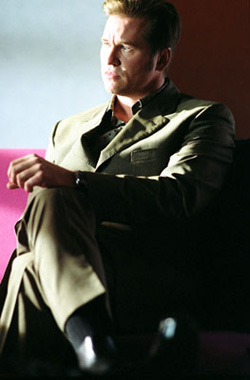 Q: Was there resistance to the stars’ stigmas?
Q: Was there resistance to the stars’ stigmas?
Black: Well, Downey had come on board, he was engaged to Susan Levine who was Joel’s right hand person, also a good producer in her own right. So she was there and he was always around. He was dating her. We’d see him in the office and I’d sort of point him out and say, "Joel, that’s Robert Downey. What’s he doing?" "He’s doing Gothika for me." And then when Gothika was over and it was time to do this, we kind of looked at each other and said, "Robert, would you read some of the lines?" We gave him some lines to read and we sat there just having fun with the script and as he said the lines, for the first time just reading them cold, it felt like I typed them right into his mouth. It was so perfect that we just loved it right there.
There was some pressure initially since they didn’t consider Downey to be a box office draw at the studio, now that we’ve got Downey, yes we can make the $15 million movie but let’s get Harrison Ford or who else is big, somebody to play Gay Perry that’s stratospheric and then we can do an $80 million version of this. And that went on for far too long, about eight months or so and finally Joel and I looked at each other and to his credit, said, "You know, let’s just make this movie for $15 million bucks. Get two really good actors, we’ve got one and let’s not worry about making the extravaganza." Which for Joel was like wow, cool, what a great thing. And at that time fortuitously, Kilmer had become available, just off a movie and his agent called and he was there. He was available.
Now of course picture Joel and I looking at each other again and saying, "Okay, we needed two great actors, but these two great actors? Robert Downey and Val Kilmer?" And I think once again, any reluctance probably was on the part of the studio as to my ability as a first time director to deal with these two personalities. What happens if they act up? Will Shane go cry in the corner or tug on Joel Silver’s sleeve and say, "Daddy, daddy." I never had a problem with it. I love actors.
Q: And Michelle Monaghan?
Black: Michelle walked in off the street as one of an audition. All the other auditioners, they would read the sort of banter, this really back and forth sharp fast paced kind of dialogue, they’d read it tough, all the other girls. They did the tough chick great but the point of the story was that lurking within the shell, she’s developed this toughness, there had to be still a view of that damaged little girl. It’s behind the eyes sort of, waiting to jump out. And she has that spark, that kind of mischief, a Nancy Drew kind of spunky brat that’s still part of her. She can walk into a room full of men in an evening gown and transfix, turn every male head in the room and have their wives slapping their husband, but she can put on jeans and a sweatshirt and be a goofball.
So from day one, I called Joel the day she auditioned, she read three scenes, I called Joel and said, "Would you step over here for a minute?" Because his office is next door. And he watched and now there were formalities like she had to read with Robert because they had to see if there’s a chemistry. She had to read for certain casting people. I still think that Joel and I both knew that day. In other words, she read three scenes, she did each scene twice, boom, she had the role. We’d never seen her before. I’d never seen her before. And she was doing something that all these other actresses weren’t. And I’d seen all the other actresses in a million things, but they weren’t giving us what she had to give.
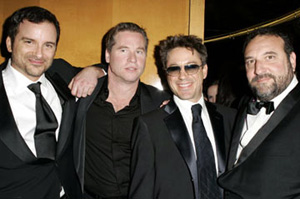 Q: Were they pressuring you for a name?
Q: Were they pressuring you for a name?
Black: Not for the girl, no. You’ll never find a studio, as long as there are male stars in a movie, a studio will never pressure you for a female star. They don’t care.
Q: Have you gotten any reaction from people you poked fun at, like Drew Barrymore?
Black: Well, I don’t really care. I don’t picture Drew Barrymore in tears being comforted by her lover. It’s all in good fun and also, like I said, the thing is, I take pokes at here, I hope that what comes across, even though it’s kind of caustic and has an edge to it is that there, I believe, is a good spirit that it’s intended to be about good people who are essentially decent inside, even though they might be thieves. They’re lost and he pretends to be an actor, pretends to be a detective. He doesn’t know who he is but we know somehow he’s a decent person. So even the jokes and even the caustic stuff, I just hope people take it in the right way because it’s meant to be fun, it’s meant to be good spirited and I want people to walk off thinking they’ve been immersed in this sort of pulpy world, but come out feeling refreshed like wow, it’s almost a breath of air. I don’t feel like at the end of Seven, you walk out just like holy shit, I want to cut my wrists. This one I think hopefully by the end you feel maybe exhilarated. I would hope so. Like you’ve taken a journey with these characters. And at the end they part ways or whatever, shake hands and say wow, we just took a little trip. I hope.
Q: Could Shane Black be the name of an action hero?
Black: I suppose so. Certainly you’re not the first to suggest.
Q: Did people not believe that was your real name?
Black: It is. Honestly, brother named Sean, sister named Shannon. My brother Terrance is older than me. He didn’t take part in this prize winning scheme.